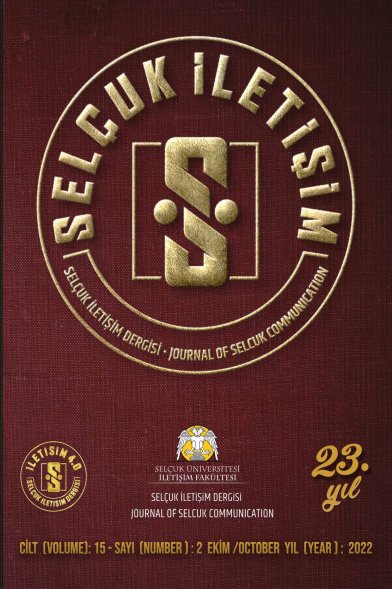Para-Sosyal İlişkinin Ürün Yerleştirme Çerçevesinde Marka Beğenilirliğine Yansıması
Tüketicilerin markanın pazarlama ve iletişim faaliyetlerine yönelik verdikleri yanıtları etkileyen psikolojik faktör marka beğenilirliği olarak değerlendirilmektedir. Bu noktada markalar, ürün yerleştirme uygulamaları ile tüketicilerde bir beğenilirlik sağlamak adına dizi karakterleriyle bireyler arasında kurulan para-sosyal ilişkiden faydalanmaktadır. Para-sosyal ilişki çerçevesinde bireyler dizi karakterini sanki gerçek bir arkadaşıymış gibi algılamaktadır. Bu ilişki derinleştikçe tüketiciler karakterleri bir rol model olarak görmekte ve markaya yönelik değerlendirmelerini yönlendirmektedir. Bu bağlamda araştırmada tüketicilerin dizi karakterleriyle geliştirdikleri para-sosyal ilişki ile marka beğenilirliği oluşumu arasındaki uyumun sorgulanması amaçlanmıştır. Bu amaç doğrultusunda araştırmada yüz yüze anket tekniği ile Isparta ilinde amaçlı örneklem ile 422 katılımcıdan veri toplanmıştır. Araştırma kapsamında değişkenler arası uyumu belirlemek adına yapısal eşitlik modellemesinden faydalanılmıştır. Gerçekleştirilen analiz sonucunda araştırma çerçevesinde belirlenen model çıktılarının kabul edilebilir uyum ile mükemmel uyum arasında olduğu sonucuna erişilmiştir. Bu kapsamda elde edilen bulgulardan hareketle ürün yerleştirme kapsamında marka beğenilirliği açıklamada para-sosyal etkileşiminin yüksek etkiye sahip olduğu sonucuna erişilmiştir. Diğer bir ifadeyle ulaşılan örneklem çerçevesinde para-sosyal ilişkinin marka beğenilirliği oluşumunu güçlü düzeyde açıkladığı görülmektedir.
The Reflection of Para-Social Relationship to Brand Likeability within the Framework of Product Placement
The psychological factor that affects the consumers' responses to the marketing and communication activities of the brand is considered as brand likeability. At this point, brands make use of the para-social relationship established between the characters of the series and the individuals in order to gain a likeability for consumers through product placement practices. Within the framework of para-social relationship, individuals perceive the character of the series as if they are a true friend. As this relationship deepens, consumers see characters as role models and direct their evaluations towards the brand. In this context, it is aimed to question the harmony between the para-social relationship that consumers develop with series characters and the formation of brand likeability. In line with this purpose, data were collected from 422 participants with a purposeful sampling in the city of Isparta using face to face questionnaire technique. Within the scope of the research, structural equation modeling was used to determine the fit between variables. As a result of the analysis, it was concluded that the model outputs determined within the framework of the research were between acceptable fit and perfect fit. Based on the findings obtained in this context, it has been concluded that the para-social interaction has a high effect in explaining brand likeability within the scope of product placement. In the words, within the framework of the sample reached, it is seen that the para-social relationship strongly explains the formation of the brand likeability.
___
- Rubin, A., & Perse, E. (1987). Audience activity and soap opera involvement a uses and effects investigation. Human Communication Research , 14(2), 246-268.
- Nguyen, B., Choudhury, M. M., & Melewar, T. (2015). An integrated model of firms’ brand likeability: antecedents and consequences. Journal of Strategic Marketing , 23(2), 122-140.
- Nguyen, B., Ekinci, Y., Simkin, L., & Melewar, T. (2015). The brand likeability scale. An exploratory study of likeability in firm-level brands. International Journal of Market Research, 57(5), 777-800.
